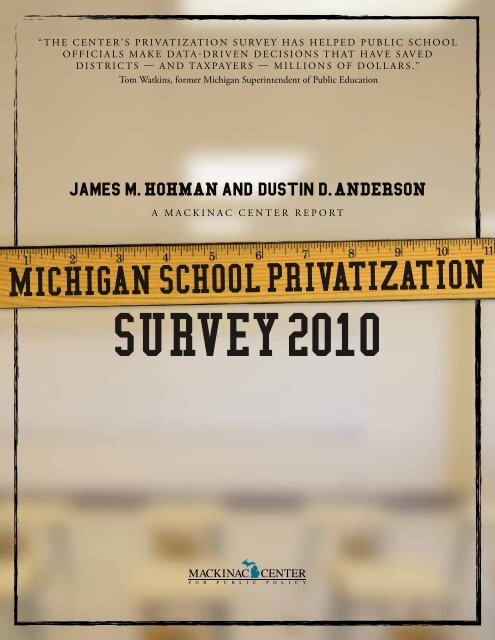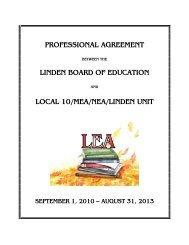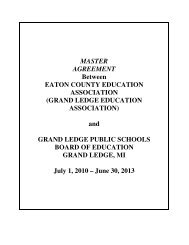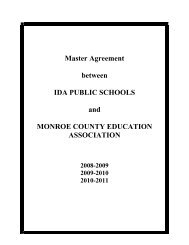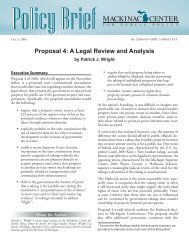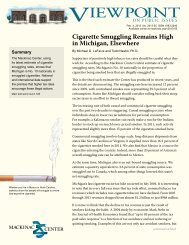Michigan school Privatization - National School Transportation ...
Michigan school Privatization - National School Transportation ...
Michigan school Privatization - National School Transportation ...
Create successful ePaper yourself
Turn your PDF publications into a flip-book with our unique Google optimized e-Paper software.
The Mackinac Center for Public Policy<strong>Michigan</strong><strong>School</strong> <strong>Privatization</strong>Survey 2010By James M. Hohman and Dustin D. Anderson©2010 by the Mackinac Center for Public PolicyMidland, <strong>Michigan</strong>Guarantee of Quality ScholarshipThe Mackinac Center for Public Policy is committed to delivering the highest quality and most reliable researchon <strong>Michigan</strong> issues. The Center guarantees that all original factual data are true and correct and that informationattributed to other sources is accurately represented.The Center encourages rigorous critique of its research. If the accuracy of any material fact or reference to anindependent source is questioned and brought to the Center’s attention with supporting evidence, the Center willrespond in writing. If an error exists, it will be noted in an errata sheet that will accompany all subsequent distributionof the publication, which constitutes the complete and final remedy under this guarantee.
<strong>Michigan</strong> <strong>School</strong> <strong>Privatization</strong> Survey 2010iiiContentsIntroduction........................................................................................................... 1Methodology......................................................................................................... 22010 Survey Results.............................................................................................. 3Food Service...................................................................................................................4Custodial Service............................................................................................................5<strong>Transportation</strong> Service...................................................................................................7Districts That Brought Services Back In-House.............................................................9Other Services Contracted...........................................................................................10Satisfaction With Contracting......................................................................................11Shared Services.............................................................................................................12Revisions in Results............................................................................................. 13Appendix A: Map of Survey Findings by <strong>School</strong> District................................... 14Mackinac Center for Public Policy
<strong>Michigan</strong> <strong>School</strong> <strong>Privatization</strong> Survey 2010 1Introduction<strong>Privatization</strong> of support services has been a method that <strong>Michigan</strong> <strong>school</strong> districtshave used for several years to lower costs. More than ever before, <strong>Michigan</strong><strong>school</strong> districts are privatizing the three main support services they offer —food, custodial and transportation. Our annual survey finds that 48.8 percentof <strong>Michigan</strong> <strong>school</strong> districts are contracting out for these services. This is an8 percent increase over 2009.The largest impetus for contracting is cost savings. The survey found that firstyearcontracts alone are expected to save districts $16.7 million cumulatively.The Mackinac Center has surveyed <strong>Michigan</strong> public <strong>school</strong> districts about theiruse of private contracts since 2001 and annually since 2005. More and moreeach year, districts contract out to save money. They also consistently reportsatisfaction with the contracts they have in place.New to the 2010 survey is a question on shared services. House Bill 6488 hasbeen introduced that would establish a shared services commission to studydistrict consolidation and allow the state superintendent to force consolidation.But there had not been a comprehensive list of the services that districts arecurrently sharing and the advantages of those arrangements. The 2010 surveyfound that a majority of districts share at least one service, with frequent sharingamong business, transportation, technology and food services.The survey is a centralized source for data regarding the growth, cost savings andsatisfaction of <strong>Michigan</strong> <strong>school</strong> districts use of private contractors. The survey hasdocumented the steady trend towards privatization of <strong>school</strong> support services.Mackinac Center for Public Policy
<strong>Michigan</strong> <strong>School</strong> <strong>Privatization</strong> Survey 2010 2MethodologyThe privatization survey was conducted between May 14 and Sept.3, 2010.The majority of survey responses were administered via telephone. Thoseresponding to the survey were superintendents, business managers, assistantsuperintendents, administrative directors and administrative assistants. Districtsrequesting that the survey be provided in written form or administered through aFreedom of Information Act request were sent letters requesting the information.All 551 public <strong>school</strong> districts in <strong>Michigan</strong> responded to this year’s survey.The districts provided answers to a series of questions on their service providers.If a district began contracting out or brought a service back in-house, they wereasked follow-up questions, including the reasons for changing and expected savings.These districts were asked to provide documentation on cost differences.Unfortunately, not all districts provided comprehensive documentation, norwas the method of documenting these costs uniform across districts. Whereapplicable, figures were annualized and estimated for the first year of serviceprovision. The districts’ published figures may not be directly comparable toeach other, but a cost accounting analysis of district savings figures is beyond thescope of this survey.Whether the district was new to contracting or had been contracting for severalyears, the district was asked whether they were satisfied with the services theprivate company has provided.It is common for districts to only contract out part of its services, whetherthrough attrition as workers leave the job or whether for the management of theservice. Districts contracting out with private vendors to provide normal servicesare included as having privatized services in this survey, even if the majority ofthe service is provided by in-house staff. However, districts contracting outspecial services support with private contractors, such as for the cleaning ofadministrative buildings or for special education busing, are not counted.Our definition of privatization also includes districts that contract out withemployee leasing agencies.Many districts contract with another district, their intermediate district, municipalgovernment or some other governmental agency. These districts are not countedin the numbers because they are not contracting to private companies.Mackinac Center for Public Policy
<strong>Michigan</strong> <strong>School</strong> <strong>Privatization</strong> Survey 2010 32010 Survey Results• 48.8 percent of districts (269 out of 551) contract outfor food, custodial or transportation services.• 57 new food, custodial or transportation services were outsourced this year.• Eight districts brought services back in-house this year.• New contracts alone were estimated to savetaxpayers $16.7 million statewide.<strong>Privatization</strong> continues to increase this year as 269 districts contracted outfor food, custodial or transportation services. Contracting has increased57.5 percent since 2001 and displays a steady trend, growing an average of5.2 percent each year.Graphic 1: Outsourcing by <strong>Michigan</strong> <strong>School</strong> DistrictsPercentage of Districts5040302010172districts196districts207districts222districts235districts249districts269districts02001 2003 2005 2006 2007 2008 2009 2010Note: The number of districts that responded each year varied.Fifty districts began new support service contracts. These were evenly splitbetween districts that already contracted out a service and districts that are newto support service contracting.One district, Bentley Community <strong>School</strong>s, contracted out for all three servicessince the 2009 survey. It is using an employee leasing firm to employ its substitutebus drivers and to replace any of its current drivers who end their service with thedistrict. It also began using an employee leasing firm to provide custodians andselected a private food service manager.Districts reported that the new contracts are expected to save $16.7 million,though not all districts were able to provide quality figures and were thus excludedfrom savings calculations. Details on expected savings from contracting out areincluded in the following sections.Mackinac Center for Public Policy
<strong>Michigan</strong> <strong>School</strong> <strong>Privatization</strong> Survey 2010 5Graphic 3Districts new to food service contractingSavingsRochester Community <strong>School</strong>s $563,403Mona Shores Public <strong>School</strong>s $200,000Inkster Public $96,000Kearsley Community <strong>School</strong>s $28,389Durand Area <strong>School</strong>s $27,802Crawford Ausable <strong>School</strong>s $9,505Chassell Township <strong>School</strong>s $4,280Davison Community <strong>School</strong>sBentley Community <strong>School</strong>sFlat Rock Community <strong>School</strong>sMeridian Public <strong>School</strong>sSwartz Creek Community <strong>School</strong>sCustodial ServiceInsufficient documentationInsufficient documentationInsufficient documentationInsufficient documentationInsufficient documentation• 26.3 percent of districts (145 out of 551)contract out for custodial services.• 32 districts began contracting out the service.• Contracting out custodial services is expected to yielddistricts $14.0 million in savings in the first year.Contracting out for custodial services grew substantially this year. From 2009the number of those districts contracting out their custodial services increased5.4 percentage points.Graphic 4: Districts Contracting Custodial Service30Percent of Districts2418126034districts51districts64districts81districts99districts115districts145districts2003 2005 2006 2007 2008 2009 2010Since 2003 custodial service contracting in <strong>Michigan</strong> public <strong>school</strong>s grew300 percent, from 6.6 percent of all districts contracting to 26.3 percent.Savings from the districts contracting out custodial services range from $11,000to $3.5 million or $5.35 to $318.37 per pupil.Baldwin Community <strong>School</strong>s had gone eight years without a custodial manager.This year the district decided to hire a custodial and maintenance manager withMackinac Center for Public Policy
<strong>Michigan</strong> <strong>School</strong> <strong>Privatization</strong> Survey 2010 6At Your Service. District officials report that they plan to continue to contractcustodial services as custodians retire or otherwise leave the district.Utica Community <strong>School</strong>s contracted out its custodial service to GCAServices and expects to save $4 million through using both contractorsand the district’s current employees. The district solicited bids to provideservices to give it an expected savings figure. It selected a vendor and asavings target, and worked with its employees providing the service to comeup with commensurate savings. The district accepted some concessions, butalso contracted out a portion of its custodial services, which is expected tosave the district $1.6 million in its first year.By contracting with Hi-Tec Building Services Inc., Les Cheneaux Community<strong>School</strong>s expects to save $62,230 in its first year. After accounting for a coupleof continued salary expenses and increased unemployment insurance expenses,the district expects to save $97,337 annually for the remainder of the contract,a savings of $302 per pupil.In addition to its 2010-2011 cost savings, Novi Community <strong>School</strong>s provideda 30-month projected cost savings of $3,622,676. For the 6,000-pupil <strong>school</strong>district, this amounts to a $233 per student annual savings, though its 2010-2011<strong>school</strong> year savings are only expected to be $1.1 million.Wayland Union <strong>School</strong>s expects to incur severance and retirement costs whentransitioning to its contract with CSM. After those first-year costs, the districtexpects to save $400,000 annually for the remainder of the contract.Pennfield <strong>School</strong>s started leasing workers with PCMI, which saved $2,400 fromthe start of the contract on March 1, 2010. The district estimated savings forthe entire 2010-2011 <strong>school</strong> year will be $11,000, which works out to an annualsavings of $5 dollars per pupil.Tecumseh Public <strong>School</strong>s expects to save $380,000 by contracting out custodialservices. The superintendent reported that the district receives superior servicefrom the private contractor for nearly half the price.Mackinac Center for Public Policy
<strong>Michigan</strong> <strong>School</strong> <strong>Privatization</strong> Survey 2010 7Graphic 5Districts new to custodial contractingSavingsWalled Lake Consolidated <strong>School</strong>s $3,535,132Utica Community <strong>School</strong>s $1,581,120Royal Oak Public <strong>School</strong>s $1,295,753Novi Community <strong>School</strong>s $1,118,915Oak Park <strong>School</strong> District $1,063,379Oxford Area Community <strong>School</strong>s $814,635Mt. Pleasant Public <strong>School</strong>s $795,448Mona Shores Public <strong>School</strong>s $719,817Wayland Union <strong>School</strong>s $400,000River Rouge <strong>School</strong> District $389,890Tecumseh Public <strong>School</strong>s $380,000Lakewood Public <strong>School</strong>s $316,678New Haven Community <strong>School</strong>s $300,000Gladwin Community <strong>School</strong> $232,291Homer Community <strong>School</strong>s $151,629Adrian Public <strong>School</strong>s $147,760Holton Community <strong>School</strong>s $133,531Hart Public <strong>School</strong>s $115,000Eau Claire Public <strong>School</strong>s $113,214Buena Vista <strong>School</strong>s $70,000East Grand Rapids Public <strong>School</strong> $65,000Les Cheneaux Community <strong>School</strong>s $62,230Mancelona Public <strong>School</strong>s $51,447Freeland Community <strong>School</strong> District $44,662Three River Community <strong>School</strong>s $39,793Pickford Public <strong>School</strong>s $34,286East Jackson Community <strong>School</strong>s $31,672Pennfield <strong>School</strong>s $11,000Baldwin Community <strong>School</strong>sBentley Community <strong>School</strong>sElkton-Pigeon-Bay Port Laker <strong>School</strong>sLamphere <strong>School</strong>s<strong>Transportation</strong> ServiceInsufficient documentationInsufficient documentationInsufficient documentationInsufficient documentation• 9.3 percent of districts (51 out of 551) contract out for transportation services.• Thirteen districts began contracting out the services.• Contracting out for transportation services is expectedto yield $1.8 million in savings in the first year.While transportation is the least contracted-out service, privatization is growingconsiderably. Since 2003 transportation service contracting more than doubled(growing 139 percent), though less than 10 percent of districts contract out forthis service.Mackinac Center for Public Policy
<strong>Michigan</strong> <strong>School</strong> <strong>Privatization</strong> Survey 2010 10Oscoda Area <strong>School</strong>s decided to bring its food service back in-house in February.Believing that the contractor’s management fees did not justify the expense, thedistrict began sharing a food service director with Tawas Area <strong>School</strong>s. Districtmanagers estimate that this will save the district $115,799 for its first full year.Pinckney Community <strong>School</strong>s ended its transportation services contract andbegan busing its students through agreements with the Livingston EducationalService Agency. The superintendent said this allows him to maintain localautonomy and save money while being able to maintain flexibility and collaboratewith other <strong>school</strong> districts. The district expects to save $174,073.Armada Area <strong>School</strong>s had contracted out the transportation director to a privatecompany. The district decided to end the contract with the private company andadd the positions responsibilities to a bus dispatcher’s duties.Graphic 8Districts that brought services back in-house Service SavingsPinckney Community <strong>School</strong>s <strong>Transportation</strong> $174,073East Grand Rapids Public <strong>School</strong>s Food $140,000Oscoda Area <strong>School</strong>s Food $115,799Comstock Park Public <strong>School</strong>s Custodial $44,000North Branch Area <strong>School</strong>s Food Insufficient documentationBaraga Area <strong>School</strong>s Custodial Insufficient documentationStockbridge Community <strong>School</strong>s Food Insufficient documentationArmada Area <strong>School</strong>s <strong>Transportation</strong> Insufficient documentationOther Services Contracted• 235 districts (42.6 percent) contract out for coaching services.• 424 districts (77.0 percent) contract out for substitute teaching services.• 248 districts (45.0 percent) contract out for snow removal.• 176 districts (31.9 percent) contract out for lawn care.• 59 districts (10.7 percent) contract out for maintenance.Districts contract out beyond food, custodial, and transportation. Every serviceabove saw an increase from last year. This year’s survey also included a newquestion on maintenance services, though these services are often providedwhen districts contract out for custodial services.Many of these services are provided by an employee leasing company that managesthe employees and handles the payroll. Contracting out for these positions cansave significant money because districts are not required to contribute to the state<strong>school</strong> employee retirement fund.Mackinac Center for Public Policy
<strong>Michigan</strong> <strong>School</strong> <strong>Privatization</strong> Survey 2010 11Aside from these services, <strong>school</strong> districts will also often contract out for security,special education, administrative, secretarial, technology and mechanical servicesamong others.Districts often provide these services in conjunction with others. For instance,district coaches and substitute teacher services may be provided within its teachercontracts and lawn care may be a part of custodial services. Data above representdistrict-reported private provision of services.Satisfaction With Contracting• 238 districts (88.5 percent) were satisfied with their private contractors.• Twelve districts (4.5 percent) were unsure.• Seventeen districts (6.3 percent) did not answer.• Two districts (0.7 percent) were not satisfied with their private contractors.A majority of <strong>Michigan</strong>’s <strong>school</strong> districts are satisfied with its contractors. Districtsthat are unsatisfied with their contracts often end the contract and bring servicesin-house or re-bid the service and hire a different company. Unsatisfied with thecustodial services provided by their previous contractor, Southfield Public <strong>School</strong>sre-bid its contract and are now satisfied with its custodial service provider.Many of the districts new to contracting reported they were unsure or refused toanswer whether they were satisfied with the service or not. These districts didn’tfeel confident enough to give a solid answer given the short duration the servicehad been contracted out.Over the years of performing this survey districts dissatisfied with theircontracted service have been rare. Districts satisfied with their private contractorshave been between 88 percent and 90 percent over the last four surveys.Graphic 9: Satisfaction from Outsourcing100908089.090.0 89.0 88.0Percent70602007 2008 2009 2010Note: The number of districts that responded each year varied.While a district’s satisfaction is often due to financial considerations, servicequality as measured by satisfaction measures can be used as an important metricwhen considering best practices in <strong>school</strong> management.Mackinac Center for Public Policy
<strong>Michigan</strong> <strong>School</strong> <strong>Privatization</strong> Survey 2010 12Shared ServicesGov. Jennifer Granholm has encouraged <strong>school</strong> districts to share services witheach other, and Rep. Tim Melton has introduced House Bill 6488 that wouldcreate a commission that can mandate service consolidation. This year’s surveychecked on whether districts have been sharing services without additionalprompting from state government. The survey found that <strong>Michigan</strong> <strong>school</strong>districts share a wide range of services.Food services are a commonly shared service, with 52 districts participating in foodpurchasing blocks or by sharing a food service manager. Okemos Public <strong>School</strong>s,for instance, shares a food service manager with Springport Public <strong>School</strong>s.Portions of transportation services are also frequently shared, with 124 districtsreporting that they share facilities and services. Districts often share their busgarages with other districts and split repair costs. Others work with each otherand their ISDs to transport athletes, take students to special events, and providespecial education. Bloomingdale Public <strong>School</strong>s, for instance, contracts out forbus maintenance with Gobles Public <strong>School</strong>s.Shared technology services are also commonplace, with 85 <strong>school</strong> districtssharing network maintenance, software purchasing, infrastructure, or technologysupervisors.Many <strong>school</strong> districts also work with each other in a number of business services,including sharing a business manager or chief financial officer, accountingservices, principals, superintendents, labor agreement negotiators, secretariesand payroll services. Districts also frequently join together to get discounts onpurchases and to lower transaction costs. There were 146 districts that reportedsharing some of their business services.Other services shared with districts are special education services, psychologistsand counselors, maintenance staff, among several others. Sharing services allowssmaller districts to tap specialists that it might not be able to employ by itself.The Kaleva Norman Dickson <strong>School</strong> District and Bear Lake Public <strong>School</strong>s sharea part-time speech aid and a special education aid.Districts have largely shared services when the opportunity arises. However,few districts reported that they use another district or an ISD to provide for alltechnology, business, food or transportation services.Mackinac Center for Public Policy
<strong>Michigan</strong> <strong>School</strong> <strong>Privatization</strong> Survey 2010 13Revisions in ResultsLawrence Public <strong>School</strong>s has been contracting out two of its seven custodialpositions since 2009. This meets the definition for having contracted out servicesand figures for 2009 have been revised to reflect contracting out this service.Wayland Union <strong>School</strong>s has been contracting out for a food service manager.Records for 2008 forward have been updated.Ann Arbor Public <strong>School</strong>s has not been contracting out regular custodial services.This district uses a private contractor for custodial substitutes, which does notmeet the definition of a regular custodial service.Muskegon Heights Public <strong>School</strong>s contracted out its custodial management to anemployee leasing firm prior to the 2009 survey.Reading Community <strong>School</strong>s has been contracting out its transportationsupervisor, a cook and a custodian with an employee leasing firm since 2007.Algonac Public <strong>School</strong>s contracted out two custodial service providers throughan employee leasing group.Concord Community <strong>School</strong>s has been contracting out for its custodial andtransportation service manager since 2005.Mackinac Center for Public Policy
<strong>Michigan</strong> <strong>School</strong> <strong>Privatization</strong> Survey 2010 14Appendix A: Map of Survey Findingsby <strong>School</strong> DistrictUpper Peninsula on Page 15Mackinac Center for Public Policy
<strong>Michigan</strong> <strong>School</strong> <strong>Privatization</strong> Survey 2010 15Lower Peninsula on Page 14Mackinac Center for Public Policy
Boardof DirectorsD. Joseph Olson, ChairmanRetired Senior Vice President and GeneralCounsel, Amerisure CompaniesJoseph G. Lehman, PresidentMackinac Center for Public PolicyJoseph J. FitzsimmonsRetired President,University MicrofilmsHon. Paul V. GadolaU.S. District Court JudgeRichard G. HaworthChairman Emeritus,Haworth, Inc.Kent B. HerrickPresident and CEO, ThermogyPhil F. JenkinsChairman, Sweepster Inc.Edward C. Levy Jr.President, Edw. C. Levy Co.Rodney M. Lockwood Jr.President,Lockwood Construction Company, Inc.Joseph P. MaguirePresident,Wolverine Development CorporationRichard D. McLellanAttorney, Dykema GossettLawrence W. ReedPresident Emeritus,Mackinac Center for Public PolicyJames M. RodneyChairman of the Board,Detroit Forming Inc.Board of ScholarsDr. Donald AlexanderWestern <strong>Michigan</strong> UniversityDr. William Allen<strong>Michigan</strong> State UniversityDr. Thomas BertonneauWriter and Independent ScholarDr. Brad BirzerHillsdale CollegeDr. Peter BoettkeGeorge Mason UniversityDr. Theodore BolemaAnderson Economic GroupDr. Stephen ColarelliCentral <strong>Michigan</strong> UniversityAndrew CoulsonCato InstituteRobert CrownerEastern <strong>Michigan</strong> University (ret.)Dr. Richard CutlerUniversity of <strong>Michigan</strong> (ret.)Dr. Jefferson EdgensBrewton-Parker CollegeDr. David FelbeckUniversity of <strong>Michigan</strong> (ret.)Dr. Burton FolsomHillsdale CollegeDr. Wayland GardnerWestern <strong>Michigan</strong> University (ret.)John GretherNorthwood UniversityDr. Michael HeberlingBaker CollegeDr. Ormand HookMecosta-Osceola Intermediate<strong>School</strong> DistrictRobert HunterMackinac Center for Public PolicyProf. Harry HutchisonMason <strong>School</strong> of LawDr. David JandaInstitute for PreventativeSports MedicineAnnette KirkRussell Kirk Center forCultural RenewalDavid LittmannMackinac Center for Public PolicyDr. Dale MatcheckNorthwood UniversityDr. Paul McCrackenUniversity of <strong>Michigan</strong> (ret.)Charles MeiserLake SuperiorState University (ret.)Glenn MootsNorthwood UniversityDr. George Nastas IIIMarketing ConsultantsDr. John PaffordNorthwood UniversityDr. Mark PerryUniversity of <strong>Michigan</strong> - FlintGregory RehmkeEconomic Thinking/E Pluribus Unum FilmsDr. Steve SafranekAve Maria <strong>School</strong> of LawLouis Schimmel Jr.Mackinac Center for Public PolicyDr. Howard SchwartzOakland UniversityJames SheehanDeutsche Bank SecuritiesRev. Robert SiricoActon Institute for theStudy of Religion and LibertyDr. Bradley SmithCapital University Law <strong>School</strong>Dr. John TaylorGrand Valley State UniversityDr. Richard K. VedderOhio UniversityProf. Harry Veryser Jr.University of Detroit MercyJohn Walter Jr.Dow Corning Corporation (ret.)Dr. William WilsonEconomic ConsultantMike WintherInstitute for Principle StudiesDr. Gary WolframHillsdale College
james m. HOHMAN and dustin d. ANDERSON<strong>Michigan</strong> schoOl <strong>Privatization</strong> Survey 2010Praise from Tom WatkinsBusiness and Educational Consultant in the United States and China<strong>Michigan</strong> State Superintendent of <strong>School</strong>s from 2001-2005“Change is avoided, until it can be avoided no longer. We have been approaching thatday for some time in <strong>Michigan</strong> and our <strong>school</strong>s.The Mackinac Center has been consistent in its philosophy of less government and maximizing our publicresources for the public good.The Center’s privatization survey has helped public <strong>school</strong> officials make data-driven decisions that have saveddistricts — and taxpayers — millions of dollars. Research by Center scholars has helped advance privatization froma seldom-used practice to an effective tool that has now been accepted by nearly half of <strong>Michigan</strong>’s <strong>school</strong> districts.Their work has helped redirect limited educational resources to the classroom. This is a benefit to our children andour collective future. This is good news for our kids and the taxpayers!”About the AuthorsJames M. Hohman is a Fiscal PolicyAnalyst with the Mackinac Center’sfiscal policy initiative. He holds adegree in economics from NorthwoodUniversity in Midland, Mich.Dustin Anderson was a2010 research intern at theMackinac Center for Public Policy.© 2010 by the Mackinac Center for Public Policy, Midland, <strong>Michigan</strong>ISBN: 1-890624-97-7 | S2010-06140 West Main Street P.O. Box 568 Midland, <strong>Michigan</strong> 48640989-631-0900 Fax 989-631-0964 www.mackinac.org mcpp@mackinac.org


